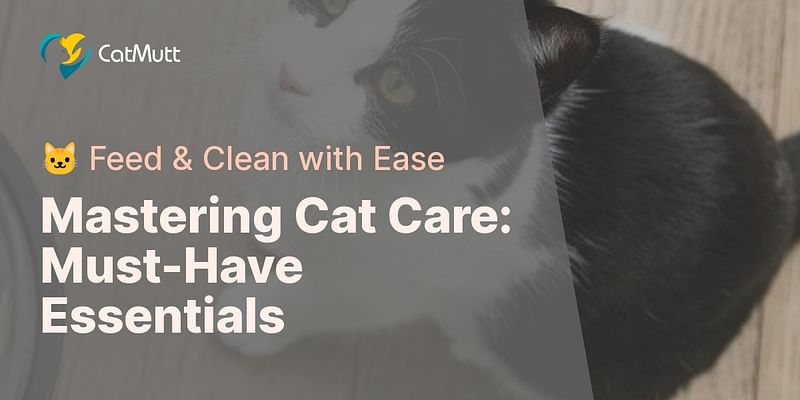Allan O'Hara is a seasoned feline behaviorist with over ten years of hands-on experience. His insightful understanding of cat behaviors has been the cornerstone of his successful career. Allan's articles are teeming with useful advice, valuable tips, and practical solutions for cat owners. His expertise covers a wide range of feline topics, making him a trusted source for all-things-cat related.
When it comes to caring for your cat, providing a balanced diet is essential. Just like humans, cats need a combination of proteins, fats, and carbohydrates to thrive. Proteins, found in meat and fish, are crucial for muscle development and overall health. Fats provide energy and help maintain healthy skin and coat. Carbohydrates, found in grains and vegetables, offer a source of energy.
Now, let's talk about cat food options. There are three main types: dry, wet, and raw. Dry food is convenient and helps keep teeth clean, but it may lack moisture. Wet food provides hydration and can be easier to eat, especially for older cats. Raw food offers a more natural diet, but it requires careful handling to prevent bacterial contamination.
When choosing cat food, consider your cat's age, health, and preferences. Consulting with a vet or pet nutrition expert is always a good idea. Remember, we don't sell products, but we're here to help you make informed decisions.
Next, let's discuss essential litter box care. Maintaining a clean litter box is vital for your cat's health and hygiene. It's recommended to scoop the litter box daily and completely change the litter every one to two weeks. There are various types of litter available, such as clay, clumping, or natural alternatives. Experiment to find the one your cat prefers. For more information on cat care, visit our FAQ section.
Lastly, monitoring your cat's eating and litter habits can provide valuable insights into their health. Changes in appetite or litter box behavior may indicate underlying issues. Regular vet check-ups are crucial, especially if you notice any changes. Learn more about cat health and care in our FAQ section.
Now that you understand the importance of a balanced diet and proper litter box care, take a moment to test your knowledge with our interactive quiz here.
Let's Find the Best Cat Food: Dry, Wet, or Raw 🍴
When it comes to caring for your cat, providing a balanced diet is essential. A cat's diet should consist of proteins, fats, and carbohydrates to ensure they get the necessary nutrients. But what type of cat food is best? [source]
There are three main types of cat food: dry, wet, and raw. Dry cat food is convenient and can help maintain dental health, while wet cat food provides hydration and can be easier to eat for older cats. Raw cat food is a more natural option but requires careful handling to prevent bacterial contamination.
Choosing the right cat food depends on your cat's age, health, and preferences. It's always a good idea to consult with a vet or pet nutrition expert to determine the best nutritional cat food for your furry friend. Remember, we don't sell products, but we're here to provide guidance. [source]
Now that we've covered cat food essentials, let's move on to essential litter box care to ensure your cat's health and hygiene. [source]
Mastering the Art of Litter Box Maintenance 🐾
Properly caring for your cat involves more than just providing them with the right food. Maintaining a clean litter box is essential for your cat's health and hygiene. A dirty litter box can lead to urinary tract infections, behavioral issues, and even stress for your feline friend.
So, how often should you clean the litter box? Ideally, you should scoop it at least once a day to remove any solid waste. This helps prevent odor buildup and keeps your cat's paws clean. Additionally, it's important to completely change the litter and clean the box every 1-2 weeks to maintain freshness. For more tips on caring for your cat, check out this helpful guide.
When it comes to choosing the best litter, there are various options available. Clumping litter is popular because it forms easy-to-remove clumps, making cleaning a breeze. Non-clumping litter, on the other hand, is often dust-free and can be a good choice for cats with respiratory sensitivities. Ultimately, the best litter for your cat depends on their preferences and any specific needs they may have.
Remember, a clean litter box is crucial for your cat's well-being. By providing them with a sanitary environment, you're ensuring their comfort and promoting good litter box habits. If you have any concerns or questions about your cat's litter box, it's always a good idea to consult with your veterinarian.
Keeping an Eye on Kitty: Diet and Litter Habits as Health Indicators 🏥
Changes in your cat's eating or litter habits can be important indicators of their overall health. If you notice any unusual changes, it's essential to pay attention and take action. Regular vet check-ups are crucial, especially if you observe any alterations in their behavior.
Your cat's eating habits can reveal a lot about their well-being. If they suddenly lose their appetite or start eating significantly more or less than usual, it could be a sign of an underlying health issue. Additionally, changes in litter box behavior, such as urinating outside the box or straining to use it, may also indicate a health problem.
By monitoring your cat's eating and litter habits, you can catch potential issues early on. Regular vet check-ups allow professionals to assess your cat's overall health and address any concerns promptly. Remember, early detection and intervention are key to keeping your feline friend healthy and happy.
Cat Care: Food and Litter Essentials Quiz
Test your understanding of how to properly care for a cat with this interactive quiz.
Learn more about 🐱 Cat Care: Food and Litter Essentials Quiz 🐾 or discover other Cat Mutt quizzes.















